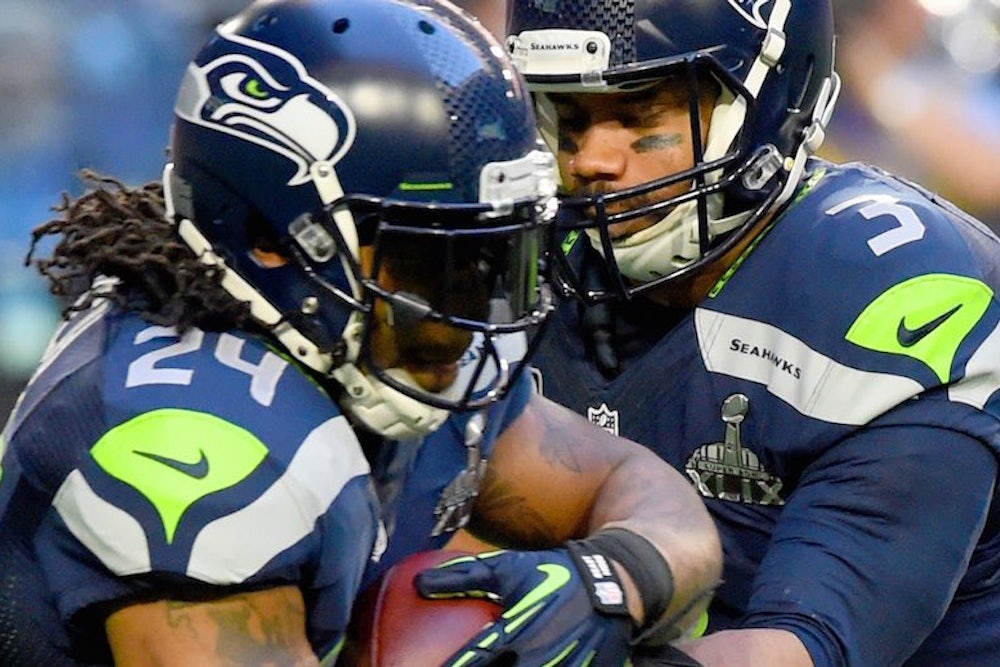We have our more sweeping, unanswerable ponderings: “Are we alone in the universe?” and “What is the meaning of life?” The twist ending of Super Bowl XLIX Sunday night added yet another quandary to the collective human imagination: Why didn’t Russell Wilson just hand the ball off to Marshawn Lynch?
On second down and goal to go from the one-yard line, the Seahawks stood at the precipice of consecutive Super Bowl championships. It was a feat that hadn’t been accomplished since the team that opposed them, the New England Patriots, did it a decade ago. Lynch, the Seahawks’ star running back, had just eclipsed 100 yards rushing for the night on the previous play. I’d wager good money that every single one of the 70,288 fans present and the largest television audience in recorded history knew Lynch was the best choice to score on the next play and secure Seattle’s second title in as many years. The coaches chose poorly, opting instead for an inside slant pass. It was intercepted. Game over.
With three downs and one yard to go, Seattle was set to rush Lynch into the Patriot line for a score. If he was somehow stopped, they even had a timeout to use to stop the clock. I cannot think of a single reason why head coach Pete Carroll, or Wilson for that matter, allowed the play to transpire as it did, other than this: It’s a play that usually works. After the game, Carroll told NFL Media’s Michael Silver in a text, “The logic and reasoning (of the second-and-1 pass) is why you throw a TD pass with six seconds left in the half,” in effect patting himself on the back for a successful chance he took at the end of the second quarter to excuse his error later.
Inside the Seattle locker room, the team’s stars were dumbfounded. “We beat 'em, bro,” defensive end Bruce Irvin told Silver. “I'm speechless. Best back in the league, and the 1-yard-line? It wasn't even the 1—it was like half a yard. I will never understand that, bro. I will never understand it.”
On the field, Lynch isn’t hyper-aggressive in the cartoonish way some of teammates and opponents exhibited during the massive brawl that erupted not long after the interception. Typically, Lynch simply refuses to submit. He’ll show open defiance by doing stuff like wearing banned gold cleats and grabbing his crotch after scoring a touchdown. Unsurprisingly, a lot of folks in the league and in the media haven’t been able to deal, slapping Lynch with what Mychal Denzel Smith called recently the “unapologetically black tax,” exacted upon black people in public life who are unwilling to kowtow to largely white critics.
Lynch gained national attention of late for becoming increasingly uncooperative with reporters, peaking with his repeated Media Day response of "I'm just here so I won't get fined." With his refusal to play by the rules of a technical job requirement, Lynch transformed recalcitrance into entertainment. Anne Helen Petersen aptly compared the 28-year-old running back last week to Marlon Brando, in that both men forcefully shunned not all media, but only the media structures which did not allow them to define themselves publicly on their own terms. Moreover, Lynch manifests a kind of public black masculinity that actively challenges and offends the stoic, team-first athlete the NFL still blindly idealizes.
It would be unfair to label Wilson, the Seahawks’ quarterback, as the flipside of that equation. He has been nothing but superlative for the Seahawks since he was drafted three years ago in the third round, both in terms of his Pro Bowl play and his affable, company-man demeanor, a source of some internal tension in Seattle earlier this season. The 5-foot-10 Wilson, also African American, makes for an ideal underdog hero, especially given that he always says the Right Thing, always has the Right Attitude, and even prays to the Right God. As Dave Zirin wrote today, he’s “Derek Jeter with a Bible.” Wilson may surely pay his “unapologetically black taxes” elsewhere, but not in the NFL arena. There, he is the Superman to Lynch’s Batman, his effervescence and speed contrasting with his teammate’s brusqueness and brutality.
At least one Seahawk theorized to Silver that the pass play was called to make Wilson the hero. “That's what it looked like,” the unnamed player told him. Zirin added more from a text he received from within the Seattle locker room: “Can’t believe it. We all saw it. They wanted it to be Russ. They didn’t want Marshawn to be the hero.”
We’ve seen that similar concept played out in civil rights strategy. Certain champions who appeared to be rising at a key moment were actually there thanks to a careful process undertaken to place them there, sometimes at the expense of other candidates who were considered less optimal. (You may recall that Rosa Parks was such an example.) If the Seattle coaches felt that a certain story was worth more than a certain championship, they should all pay with their jobs. But in the heat of a Super Bowl climax, it is difficult to believe that a coach would deliberately choose to elevate one player to the headlines with a championship at stake. I’d be shocked if that was the case, however. What is more likely is that Carroll and company made an awful, reckless decision and Butler made a brilliant play.
Such theories might be judged reckless, but I would disagree. Smith's "unapologetically black tax" exists, and it has consequences for people like Lynch. Even if this particular hero-narrative is ultimately wrong, it is still plausible—and discussing it is hardly unhealthy. This is all part of the grieving process for the Seahawks and their fans, and asking them to fast-forward to the acceptance phase is unfair. Like all football players, the Seahawks operate in an empirical, cause-and-effect universe. They recognize certain realities on the field. In time, they’ll grasp this one, too.
